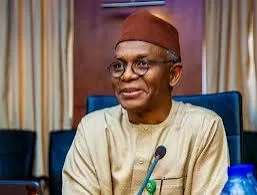
₦423B THEFT: EL-RUFAI ACCUSES JUDGE OF BIAS, SEEKS CASE TRANSFER
Former Kaduna State Governor, Nasir El-Rufai, has filed a petition against Justice Rilwanu Aikawa of the Kaduna Federal High Court, alleging gross bias, injustice, and denial of fair hearing in his ongoing legal case.
The petition, dated July 18, 2024, was submitted to the Chief Judge of the Federal High Court of Nigeria, Justice John Tsoho.
El-Rufai, represented by his counsel Adetayo Adeyemo, requested that his fundamental human rights suit, marked FHC/KD/CS/55/2024, be transferred to another judge to ensure justice is served.
The former governor detailed a series of events he believes demonstrate bias in the handling of his case.
According to El-Rufai, the suit was initially filed on June 26, 2024, with a hearing set for July 8. During the hearing, El-Rufai’s counsel, S.S. Umoru, informed the court that all parties had been served and were within the time frame to file their responses.
However, the 1st respondent’s counsel, Sule Shaibu (SAN), indicated they were one day late in filing their response. The matter was then adjourned to July 17.
El-Rufai’s principal counsel, A.U. Mustapha (SAN), travelled from Lagos to Kaduna for the hearing on July 17, only to be informed that the court would not be sitting.
That night, El-Rufai received news that the hearing had been rescheduled for the following day, July 18. Due to the short notice, El-Rufai’s team filed for an adjournment and served the notice to all parties involved.
Despite this, El-Rufai alleges that the court proceeded with the hearing on July 18 without notifying him or his counsel.
He claims that the respondents were allowed to adopt their processes and participate in the proceedings in his absence, which he views as a clear indication of bias and a denial of his right to a fair hearing.
El-Rufai has called for the transfer of his case to another judge to ensure impartiality and justice in the proceedings. The outcome of this petition and its impact on the ongoing legal battle remains to be seen.
He said, “The applicant was not put on notice for the proceedings of July 18 2024, as expressly explained in the letter of adjournment. We only got a whiff of the hearing on the night of July 17, which is an extremely short time for us to appear in court. Service of hearing in a matter is sacrosanct and our courts have held severally that every party must be put on notice before his case can be heard.
“In view of the foregoing, we humbly apply for the transfer of this matter from the trial court presided over by honourable Justice R.M Aikawa whereby the relevant applications can be heard as the applicant has lost all confidence in the judge to continue to hear and determine the matter. Justice must not only be done but must be seen to be done.
“Having expressly refused to put the applicant on notice before hearing the matter and proceeding to hear same when the applicant was still within time, to respond to the 1st respondent application, the average man on the street could see which way the judge is headed.”The former governor also alleged he was not given the opportunity to respond to the 1st respondent’s counter-affidavit and written address.

